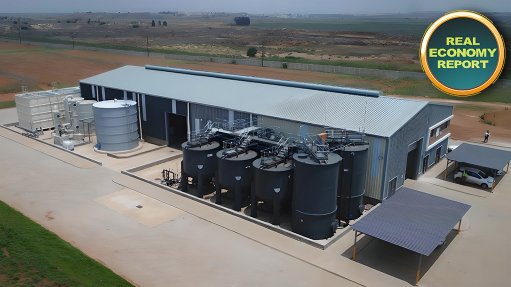Technological Innovations in Logistics Support the Surge of Global Commerce
This article has been supplied as a media statement and is not written by Creamer Media. It may be available only for a limited time on this website.
By Natasha Parmanand - Managing Director of FedEx Express Sub-Saharan Africa Operations.
As trade grows, particularly in Africa, constant technological innovation ensures that logistics providers keep pace, writes Parmanand.
With the African Continental Free Trade Area (AfCFTA) agreement now signed by 54 of Africa’s 55 countries, the stage is set for a new era of frictionless trade across the region, and significant growth in trade volumes.
Africa already imports R676 billion (approximately USD37 billion) in freight and logistics goods every year, and the World Economic Forum (WEF) predicts that AfCFTA ratification will boost demand for intra-African freight by 28% by 2030.
Logistics networks are the backbone for trade growth, and it will take rapid and ongoing technological innovation to ensure that logistics providers keep pace with this growth. Fortunately, the logistics industry has a long history of technology-driven innovation, and this is likely to accelerate in the future.
FedEx celebrates its 50th anniversary this year, and the company has helped to shape - this logistics evolution over the years.
E-commerce drives trade growth
In Africa today, a key technology driving trade growth is e-commerce. In South Africa, for instance, e-commerce sales grew by 35% in 2022 to R55 billion (approximately USD3 billion), on top of 40% growth in 2021.
E-commerce expansion will be further boosted by the increased adoption of smartphones in emerging markets. The mobile-network industry expects to see 400 million more smartphone users by 2025 – mostly from Sub-Saharan Africa and Asia Pacific.
Logistics providers are well-prepared to support this trend by optimizing their shipping processes for mobile. Customers are now able to manage their shipments through convenient app-based interfaces. They can quickly obtain a rate and transit time quotation, create an international shipment, schedule and manage package pickup from their preferred location, and even track their packages on the go.
Technology for secure tracking
Track-and-trace capabilities have long been part of the logistics offering. Today, sensor-based technology gives customers the option of advanced monitoring with near real-time access to package information. Customers can track a shipment’s exact current location, its temperature, whether it has been opened — and even get proactive alerts in case of any unexpected incidents. This technology is ideal for real-time tracking of high-value shipments like healthcare and aerospace equipment.
Blockchain is another innovation that documents every stage in a product’s journey, including its delivery. Shipment information can also be shared with partners and customers across the supply chain to ensure visibility, and to identify inefficiencies, which can be improved on a constant basis.
Electronic customs clearance has eased shipping challenges and enabled frictionless cross-border trade through digital capabilities. Small businesses and other import-exporters can now upload documents, customize their forms, and gain pre-clearance assistance through online portals.
The future of logistics
In the future, the most successful logistics organizations will be those that are most agile and can quickly adapt to their customers’ needs. E-commerce customers are moving rapidly towards mobile online shopping – what’s known as m-commerce. Therefore, future online retail platforms will have to be optimized for mobile and must meet consumers where they are – not just on online retail sites, but on social media platforms like TikTok, Instagram, and in metaverse-based social and gaming environments.
Research also shows that customers will increasingly demand sustainable logistics. To meet these evolving consumers’ needs, and to continue operating as responsible corporate citizens, logistics providers are working towards electrifying their fleet and committing to achieving carbon-neutral operations, within timeframes of less than 20 years. Partnerships have also been established with university research institutions to help to shape this low-carbon future.
Consumers of the future will also expect even faster deliveries. We are likely to see several emerging technologies enter the logistics mainstream such as driverless road deliveries, AI-driven virtual shipping assistants, robotic couriers and warehouse staff, as well as aerial drone deliveries. Multimodal shipping is another trend that is likely to see increased adoption in the future, combining air, sea, road or rail freight to ensure the ideal delivery outcomes.
The logistics industry of the future will involve far greater use of data-driven new technology. But the key principle will remain unchanged: using the latest available technology to deliver efficiently and sustainably, in line with the consumers’ constantly evolving needs.
Comments
Press Office
Announcements
What's On
Subscribe to improve your user experience...
Option 1 (equivalent of R125 a month):
Receive a weekly copy of Creamer Media's Engineering News & Mining Weekly magazine
(print copy for those in South Africa and e-magazine for those outside of South Africa)
Receive daily email newsletters
Access to full search results
Access archive of magazine back copies
Access to Projects in Progress
Access to ONE Research Report of your choice in PDF format
Option 2 (equivalent of R375 a month):
All benefits from Option 1
PLUS
Access to Creamer Media's Research Channel Africa for ALL Research Reports, in PDF format, on various industrial and mining sectors
including Electricity; Water; Energy Transition; Hydrogen; Roads, Rail and Ports; Coal; Gold; Platinum; Battery Metals; etc.
Already a subscriber?
Forgotten your password?
Receive weekly copy of Creamer Media's Engineering News & Mining Weekly magazine (print copy for those in South Africa and e-magazine for those outside of South Africa)
➕
Recieve daily email newsletters
➕
Access to full search results
➕
Access archive of magazine back copies
➕
Access to Projects in Progress
➕
Access to ONE Research Report of your choice in PDF format
RESEARCH CHANNEL AFRICA
R4500 (equivalent of R375 a month)
SUBSCRIBEAll benefits from Option 1
➕
Access to Creamer Media's Research Channel Africa for ALL Research Reports on various industrial and mining sectors, in PDF format, including on:
Electricity
➕
Water
➕
Energy Transition
➕
Hydrogen
➕
Roads, Rail and Ports
➕
Coal
➕
Gold
➕
Platinum
➕
Battery Metals
➕
etc.
Receive all benefits from Option 1 or Option 2 delivered to numerous people at your company
➕
Multiple User names and Passwords for simultaneous log-ins
➕
Intranet integration access to all in your organisation





















